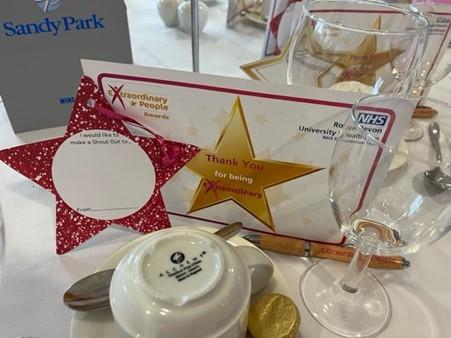Budget-friendly recognition

Overview
Following a merger between two large NHS trusts the newly formed organisation needed to improve and develop its staff recognition practices to help embed a culture of appreciation and improve morale.
Key benefits and outcomes
- Improved staff sentiment and engagement – staff survey and people pulse results showed a marked increase in employees feeling valued and recognised, with positive feedback rising to 30 per cent in quarterly surveys.
- Improved morale – day-to-day feedback confirmed that both formal and informal recognition had a tangible impact on staff motivation and morale.
- Strengthened organisational culture – initiatives like Team Royal Devon Week and long-service recognition have helped embed a culture of appreciation, reinforcing the trust’s commitment to being an employer of choice.
- Enhanced transparency and trust – open communication around challenges helped build trust and understanding among staff, demonstrating the value of honesty and empathy in organisational change.
What the organisation faced
Following the merger of two trusts in April 2022, the newly formed Royal Devon University Healthcare NHS Foundation Trust identified a need to improve inconsistent and underdeveloped staff recognition practices.
Initial stakeholder consultations showed there was a widespread lack of appreciation and recognition across the workforce. The absence of a clear recognition strategy contributed to a negative organisational culture, as reflected in staff and pulse survey feedback calling for improvements to boost morale.
In response, a newly formed employee experience team began reviewing legacy recognition approaches. Its goal was to create a transparent, equitable recognition strategy that included both formal schemes and simple, everyday gestures, encouraging staff to say thank you, celebrate small wins and highlight day-to-day achievements.
With no dedicated budget, the team had to innovate, developing a meaningful recognition programme on a shoestring.
What the organisation did
To address the lack of consistent recognition, the employee experience team consulted stakeholders across the trust to identify existing practices worth retaining and areas needing improvement. They also explored best practices from other NHS and non-NHS organisations. Despite financial constraints, the team committed to launching meaningful recognition initiatives through innovative, low-cost solutions.
The trust implemented a tiered approach that included formal and informal recognition initiatives but also dedicated appreciation in the following ways:
Formal recognition
The trust introduced a unified staff awards scheme, building on the existing Extraordinary People Awards. The updated programme features 14 award categories, accessible to all staff groups, with finalists and winners celebrated at an annual ceremony attended by around 300 people. The event is fully funded through sponsorships secured via a collaborative effort between procurement, communications and trust managers.

In addition, the trust implemented a long-service recognition scheme, awarding certificates and milestone badges (starting at ten years, then every five years) to long-serving staff. Despite challenges with ESR data accuracy and the volume of staff employed by the trust, the initiative was well received and appreciated by staff.
Informal recognition
The trust launched a thank-you scheme, offering customisable e-cards via the intranet, with printed versions available for staff without regular digital access. Over 4,000 cards have been downloaded since the scheme was launched, with new designs introduced during appreciation weeks to keep the initiative fresh.
It also introduced 'shout out Thursdays', where staff can nominate colleagues for monthly recognition. These shoutouts, shared in dedicated communications, celebrate achievements ranging from course completions, personal achievements to acts of kindness towards members of staff. With up to 200 shoutouts per month, the initiative significantly boosted staff morale at no financial cost.
Appreciation
To celebrate staff and foster a culture of appreciation, the trust launched Team Royal Devon Week, held annual in early July to coincide with the NHS’s birthday. The week reinforces the message that all staff are valued and recognised for their contributions.
Key activities include:
- roadshows highlighting the rewards, benefits and recognition initiatives available
- health and wellbeing drop-in sessions including free health checks and yoga classes
- fireside chats and workshops with executives
- feedback forums
- collaborative events with internal teams (e.g. sustainability, inclusion)
- free refreshments across sites.
The trust secured sponsorship and donations from local suppliers to fund giveaways and prize draws. Over 2,000 random acts of kindness were delivered during the week, including crocheted hearts, canteen vouchers, reusable coffee cups and ice cream tokens—reinforcing everyday appreciation alongside formal events.
A standout moment was a partnership with John Lewis, which hosted an exclusive after-hours shopping event for NHS staff, offering discounts and pop-up shops. The event, which came at no cost to the trust, had a significant and lasting positive impact on staff morale.
To ensure inclusivity across the trust’s wide geography, health and wellbeing champions helped coordinate local events and distribute appreciation packs at community sites.
Results and benefits
The 2023/4 NHS staff survey results showed a significant improvement in how valued and recognised employees feel, with notable changes in responses to questions around reward and recognition—demonstrating that the initiatives are meeting the intended goal.
The quarterly people pulse survey echoed this trend, with positive staff comments increasing to 30 per cent, many of which referenced appreciation for their work and long service.
Day-to-day feedback also confirmed that both formal and informal recognition efforts are boosting morale and engagement. Staff consistently reported that simple, meaningful gestures, like thank you cards and shoutouts, made a real difference.
These schemes are low-cost, so are a long-term, sustainable solution. Uptake of the initiatives has grown as awareness and accessibility has improved across the trust.
Overcoming obstacles
The employee experience team presented the data to the executive team, highlighting the need to improve recognition within the workforce. However, as the trust was in financial measures, no formal funding was available.
The team was able to secure a small amount of money from charitable funds but the majority of funding for the larger scale events was via sponsorship which was achieved by reaching out to external companies and building a working relationship.
The inaccuracy of ESR data for the long-service recognition scheme resulted in some staff being frustrated with the process and having to wait until they reach one of the five yearly milestones. The employee experience team, where possible spoke with colleagues who were upset and provided staff with the reasons why the data was inaccurate and due to the size of the trust the scheme working in five yearly intervals. The employee experience team found that being open, honest and transparent with staff was the best approach for them to gain understanding around the processes and rationale of the scheme.
Take-away tips
- Engage with your workforce throughout the process of improvement, taking time to understand what is important to them. Be transparent and feedback if things haven’t gone quite right.
- Ensure your recognition initiatives are fair, equitable and accessible to all staff groups within your organisation, regardless of role and pay band.
- Although large incentives have their benefits, start with the basics - it’s the simple things that count.
- Be bold in your approach. Seek support connect with external organisations who you may be able to partner with for sponsorship opportunities.



